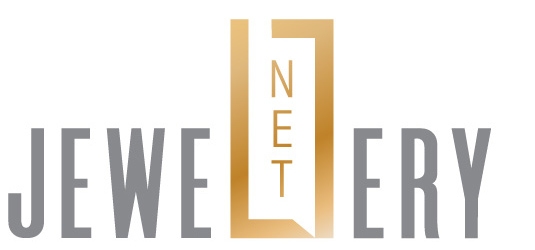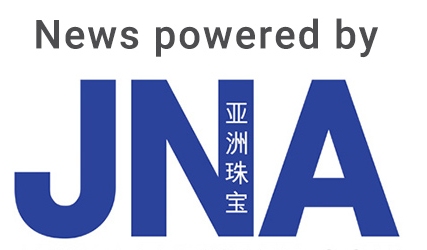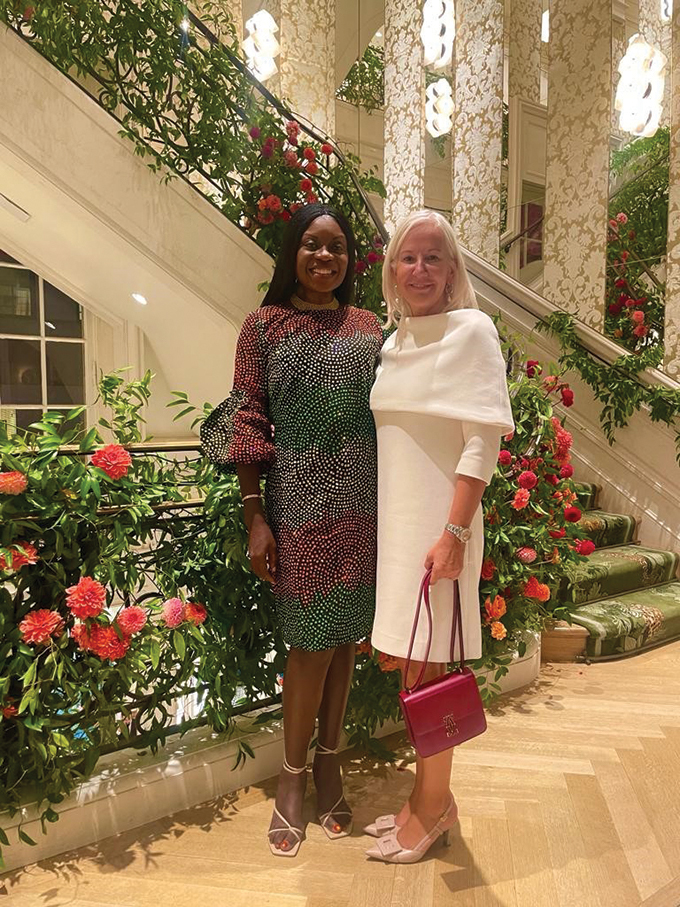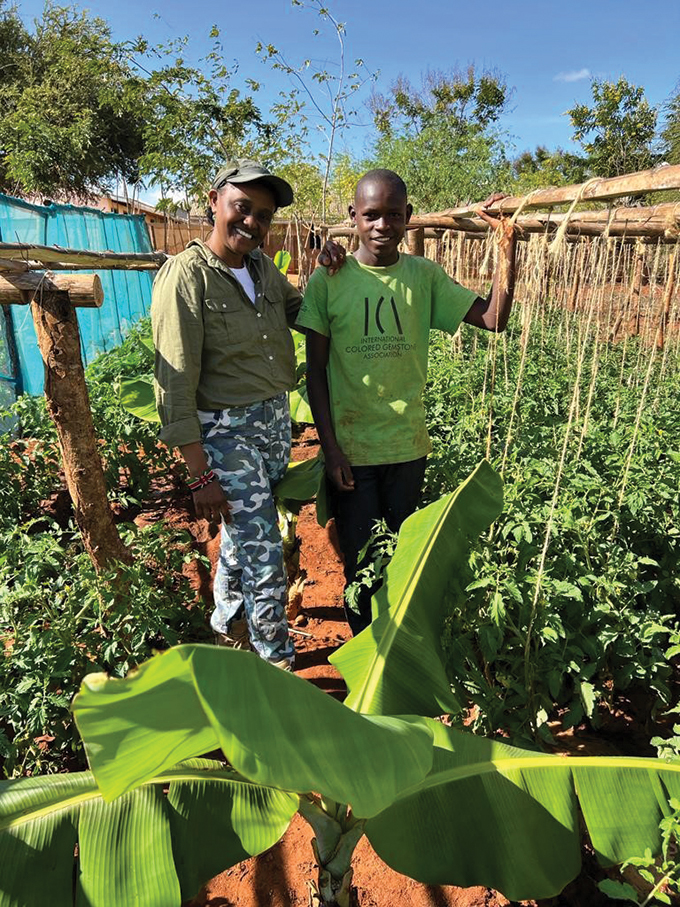Conscious consumerism, the climate emergency and corporate accountability are fuelling the gem and jewellery industry’s drive towards a more sustainable path. JNA sits down with leading trade organisations that are actively pursuing Environmental, Social and Governance (ESG) initiatives.
This article first appeared in the JNA March/April 2024 issue.
Sustainability considerations could somehow influence 20 per cent to 30 per cent of fine jewellery purchases by 2025, according to a McKinsey & Co report on the jewellery trade published in 2021.
In fact, concerns over an impending climate crisis alongside evolving consumer preferences are driving gemstone and jewellery companies to rethink priorities and revisit business practices – all in the aim of embracing eco-friendly processes throughout the supply chain.
Being sustainable can also help companies earn the trust of younger consumers.
According to industry experts, leadership programmes can aid in spearheading Environmental, Social and Governance (ESG) strategies.
Headlining sustainability initiatives in the jewellery sector are the Responsible Jewellery Council (RJC), the International Colored Gemstone Association (ICA), Diamonds Do Good (DDG), Watch and Jewellery Initiative 2030 (WJI 2030) as well as the Gemological Institute of America (GIA), among others.
Taking action
Geneva-based WJI 2030, founded by luxury group Kering and Richemont-owned Cartier, brings together watch and jewellery brands, trade associations and key stakeholders to make impactful changes across three pillars: Climate resilience; biodiversity and nature; and inclusiveness.
Currently with nearly 60 members, it is guided by the Ten Principles of the United Nations Global Compact and the 17 Sustainable Development Goals (SDG).
Iris van der Veken, executive director of WJI 2030, explained, “As we step into 2024, the future emphasises integrity, transparency, traceability and circularity, which demands a collaborative mindset.”
Belonging to an industry that is “deeply connected to beauty and emotions,” jewellers carry a dual responsibility: To nurture and to act, she noted.
As such, rethinking the entire jewellery lifecycle, from design to aftercare, and exploring circularity in business models have become essential. Van der Veken added, “While supply chain sustainability is intricate, deeper collaboration and sharing of best practices can drive significant progress in sustainability dimensions.”
Among WJI 2030’s significant achievements in 2023 were the creation of a multi-sectoral governance framework, obtaining 15 member-companies’ commitment to Science-Based Targets Initiative (SBTi), and the launch of the Nature Primer, which will eventually lead to an industry-level Nature Positive Roadmap containing concrete steps on how the industry can contribute to a Nature Positive world.
The group also introduced a case study on gender-responsive procurement in partnership with UN Women and produced the Human Rights Navigator to provide practical solutions for members navigating pertinent regulatory systems. “Recognising the importance of small and medium-sized enterprises (SMEs) in responsible supply chains, we plan to pilot the HR Navigator with suppliers in the coming months,” said Van der Veken.
To ensure credible reporting and prevent greenwashing, Van der Veken said WJI 2030 formulated Key Performance Indicators (KPIs) based on established sustainability reporting frameworks such as the Taskforce on Nature-Related Financial Disclosures, the Global Reporting Initiative (GRI) and SBTi.
Responsible jewellery
RJC has also made significant strides in making sustainability more mainstream.
In June 2023, RJC, GIA and the Mineralogical & Geological Museum of Harvard hosted a responsible jewellery event titled, “State of the Art Summit," which brought together experts from MIT and Harvard, alongside artists, RJC members and other industry players.
RJC Executive Director Melanie Grant shared, “We reached several conclusions on how to manage energy transition around supply chains. One requirement is communicating the importance of responsible practices in the jewellery trade more efficiently through increased storytelling, education and engagement around challenges and opportunities, especially for young people who will inherit the industry.”
RJC will also host a series of networking events for its members to promote and discuss the business of jewellery and how it can move forward with purpose and vision.
“The concept of sustainable jewellery has come a long way in the last 16 years, and we work hard to constantly evolve with and lead the market,” Grant remarked. “We are also working on an entirely new standard focused on lab-grown materials.”
Sustainable mining communities
Challenges in the supply chain are likewise being addressed. Organisations like DDG and ICA, which established the Gems Keep Giving initiative, aim to enhance and empower local mining communities.
These societies, primarily located in developing countries, depend heavily on artisanal mining and cutting for their economic well-being. Often centred around gem deposits, community members participate in these activities to supplement income derived from agriculture and livestock.
ICA’s Gems Keep Giving helps mining communities prosper and develop in a “safe, sustainable and inclusive” environment. With ICA membership spanning 47 countries, the organisation leverages this extensive reach to strategically identify areas where it can maximise its impact and contribute most effectively.
Douglas Hucker, CEO of ICA, said, “Our goal extends beyond providing short-term benefits to these communities. Instead, we aim to collaboratively work with community members, miners, cutters and families, empowering them to take ownership of these efforts and actively engage in sustainable developments that bring lasting improvements.”
The programme is focused on building infrastructure that can endure and thrive beyond initial investments. Its inaugural project in the Kamtonga Village in Kenya, Africa provides sustainable clean water supply for drinking, cooking, washing and irrigation purposes.
Hucker shared, “One of our objectives is to introduce Gems Keep Giving to the broader industry, particularly targeting retailers interested in incorporating our sustainability narrative into their businesses.”
For its part, global non-profit DDG supports initiatives that develop and empower people in diamond-producing communities in Africa, particularly Botswana; India and, starting this year, the Northwest Territories of Canada. It also assists families of miners in accessing education and career opportunities.
In 2021, it launched the DDG Entrepreneurship Grant Programme and has since put 725 entrepreneurs through an extensive programme led by leading business moguls and professors. “Through this, we further supported 30 entrepreneurs with grants ranging from US$5,000 to US$20,000, fostering business growth and community advancement,” said DDG President Kathy Corey.
One of the grant recipients is Tshireletso, a dynamic young farmer from Botswana who has left an indelible impact on her nation's agricultural landscape.
Corey explained, “When she enrolled in our free entrepreneurship programme, she did not anticipate securing funding for her farm. She persevered through a rigorous 16-week business training, involving multiple interviews and business pitches.”
Tshireletso received the grant in 2022. Her business, Erba Farms, began on the windowsill of her parents’ backyard. Today, it is present in over 25 supermarkets across Botswana, creating employment in her rural community.
“These grants invest in local entrepreneurs who make a difference in their local communities. We cannot wait to see how these will impact individuals and communities in the Northwest Territories,” said Corey.
ESG for smaller businesses
More stringent regulations and rising expectations from consumers and investors underscore the imperative nature of sustainability reporting.
Van der Veken remarked, “Sustainability reporting brings significant value to organisations of all sizes. With an increased focus on reporting across the value chain, SMEs, particularly mid-to-upstream SMEs, play a pivotal role in furthering transparency and providing valuable data.”
As clamour for supply chain due diligence rises, SMEs will increasingly need to disclose ESG data to downstream buyers. Their contribution can significantly impact the development of a more responsible supply chain, she added.
Meanwhile, supply chain due diligence requirements are also intensifying across jurisdictions, making it essential for organisations throughout the value chain to deliver comprehensive sustainability disclosures.
Van der Veken said luxury brands are undergoing a paradigm shift, viewing sustainability as a strategic imperative, more than just a compliance measure. SMEs can do the same while focusing on prioritising disclosure of topics most relevant to their operations to effectively manage risk and showcase impact.
SMEs can use industry standards like the WJI 2030 framework to ensure consistent reporting of KPIs across the board. As SMEs are at various stages of the sustainability reporting journey, it is also important to balance the disclosures of quantitative and qualitative KPIs to ensure that organisations are reporting information that is consistent and comparable, while effectively managing costs, she added.
Smaller establishments can streamline their reporting processes by effectively leveraging technology services and platforms such as ESG Book, which is designed to assist enterprises on their sustainability reporting journey.
“The ESG Book enables companies to be custodians of their own data, allowing them to publish and share their disclosures with investors and stakeholders,” noted Van der Veken.
According to Corey, small businesses can achieve ESG goals by collaborating with organisations that provide feasible roadmaps for reaching these objectives. She said, “Many companies are already supporting some form of community-building programmes around the areas where they do business. Communicating these initiatives to customers demonstrates the company's commitment to responsible practices aligned with shared values.”
Grant, for her part, said sustainability in the jewellery industry is a mindset that leads to a set of actions such as applying due diligence, abiding by legislation and incorporating SDG goals into business strategies. “The first step is to simply start. Read, listen and learn. Join a scheme, talk to your suppliers and make your own unique contribution. The future of jewellery depends on it,” she said.








